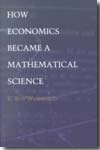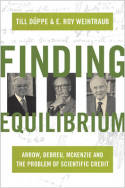How economics became a mathematical science
- ISBN: 9780822328711
- Editorial: Duke University Press
- Fecha de la edición: 2002
- Lugar de la edición: Durham. None
- Encuadernación: Rústica
- Medidas: 24 cm
- Nº Pág.: 313
- Idiomas: Inglés

In How Economics Became a Mathematical Science E. Roy Weintraub traces the history of economics through the prism of the history of mathematics in the twentieth century. As mathematics has evolved, so has the image of mathematics, explains Weintraub, such as ideas about the standards for accepting proof, the meaning of rigor, and the nature of the mathematical enterprise itself. He also shows how economics itself has been shaped by economists' changing images of mathematics. Whereas others (most recently Philip Mirowski) have viewed economics in the context of physics, Weintraub presents a different picture, one in which changes in mathematics-both within the body of knowledge that constitutes mathematics and in how mathematics is thought of as a discipline and as a type of knowledge-have been intertwined with the evolution of economic thought. Weintraub begins his account with Cambridge University, the intellectual birthplace of modern economics, and examines specifically Alfred Marshall and the Mathematical Tripos examinations - tests in mathematics that were required of all who wished to study economics at Cambridge. He then interrogates the idea of a rigorous mathematical economics through the connection of the American economist Griffith Conrad Evans with the Italian mathematician Vito Volterra and moves on to the role of David Hilbert and how the mathematical issues of formalism and axiomatization played out in economics. Finally, the social and intellectual history becomes a personal history that reconstructs the career of the economist Sidney Weintraub, whose relationship to mathematics is viewed through his relationships with his mathematician brother, Hal, and his mathematician-economist son, the book's author. A major study of the mathematization of economics, this work will interest economists, mathematicians, philosophers.







